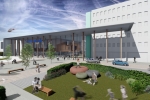Patients in the South West will benefit from an improved ambulance service thanks to the addition of more than 60 vehicles through £6.7 million of capital funding, which will improve the ambulance trust’s operational resilience over winter.
As part of a nationwide funding boost for the NHS’s 70th birthday, South Western Ambulance Service NHS FT will receive £6.7 million of funding from the Department of Health and Social Care for 63 ambulances. Part of the long-term plan for the NHS, the capital investment will increase support for hardworking and dedicated paramedics and ambulance staff.
Welcoming the news, Scott Mann MP said:
“I’m delighted to see the 70th Anniversary of the NHS being celebrated in Cornwall through the provision of 60 new ambulance vehicles to ensure that sparse rural communities in the South West receive faster and more effective emergency services.
“The rural nature of Cornwall is a challenge for our ambulance service because vehicles and paramedic teams have to travel many miles to reach emergencies. This means that resources can become unavailable for long periods of time, and these new vehicles will be a great boost for the people of Cornwall and wider South West region.”
The changes build on the recent announcement that paramedics will be given body cameras to increase protection from violence and bring attackers to justice, in a trial involving 465 ambulances and paramedic teams.
Health Minister Stephen Barclay said:
“This improvement of the Trust’s fleet will bring vital benefits to patient care in the South West, and so I am delighted to announce this funding as the NHS marks its 70th birthday.
“This additional money will give paramedics extra support to help ensure the trust is prepared as we face what we know can be challenging situations over the winter period.”
A total of £36.3million capital funding is being given through Sustainability and Transformation Partnerships (STPs) to six trusts across the country, and is set to be spent on 256 new vehicles.
This investment will help ambulance services achieve the right mix of vehicles to deliver the new national response time standards and increase the efficiency of the service. It will also give ambulance trusts more resources to respond to calls which ultimately will mean a better service for patients, better operational resilience for winter and better support for staff.
Backed by the Department of Health and Social Care, STPs are groups of local NHS leaders and staff working with councils who arrange joined-up social care and other community health services. They look at the needs of patients and design service plans bespoke to the area, offering care that is closer to home and means fewer trips to the hospital.

